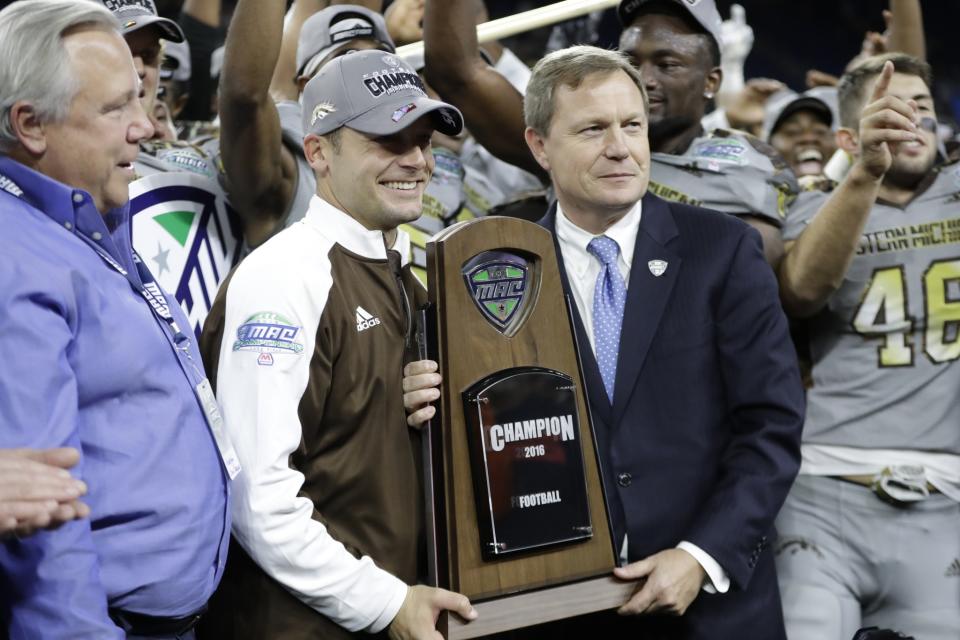Mid-American Conference commissioner doesn't think a separate playoff is the answer

Mid-American Conference commissioner Jon Steinbrecher can appreciate the willingness of the athletic directors in his conference to stir the pot when it comes to a conversation about the College Football Playoff.
But that doesn’t mean he agrees with the sentiment.
Last week, Northern Illinois athletic director Sean Frazier told ESPN there’s a growing movement by the Group of Five schools — schools in the American, Conference USA, Mid-American, Mountain West and Sun Belt conferences along with independents BYU, UMass and Army — to start their own playoff because of the limited access to the College Football Playoff.
But Steinbrecher said that while the idea might be good in theory, it’s not feasible financially.
“The logistical ability of doing that is, from where I’m sitting, almost impossible,” Steinbrecher told Yahoo Sports.
Despite the lack of access to the top four spots of the College Football Playoff, Steinbrecher points out that the Group of Five programs (a term he abhors, by the way) have far more playing and monetary opportunities than they did 15 or 20 years ago.
[Follow Dr. Saturday on social media: Twitter | Facebook | Tumblr]
On Monday, MAC member Western Michigan will play Wisconsin on the Cotton Bowl, marking the first MAC team to participate in the newly dubbed New Year’s Six Bowls. Thanks to the Broncos’ appearance, the MAC will receiver $4 million and also $2.08 million to cover expenses. That’s in addition to the $83.5 million the Group of Five shares and distribute to the member conferences at its discretion. Plus, the Group of Five schools make money from bowl partners and postseason television distribution.
It would be difficult for the Group of Five to replicate that financial boon if it struck out on its own.
In a sense, the College Football Playoff has become necessary for many of the Group of Five programs to stay afloat and stay competitive.
To put the numbers in perspective, when Northern Illinois played in the Orange Bowl in 2012, the MAC received $8 million total as part of the $12 million the Group of Five schools (then called non-automatic qualifiers) received for having a BCS bowl participant. The schools also divided $12-14 million as part revenue sharing.
All of the new monetary figures are thanks to record television and distribution deals that have made college football quite the booming business and Steinbrecher said the MAC is benefiting. The television contracts are more lucrative and there are far more eyes on MAC football than have ever been before. Even though the MAC plays games on unconventional days, those contests have become must-watch games for people who have dubbed them “#MACtion” because of their high scoring and excitement.
“The system is so much better than where we were 15 or 20 years ago,” Steinbrecher said. “The access we have, the opportunity we have. We’ve had the Boise State’s, the Northern Illinois, the Western Michigans and Houston last year playing in New Year’s Six games that they would have never been in before. Access was not there. And so the fact that we now have that access is quite a positive.”
But it’s still not even. A report by ESPN’s Outside The Lines at the beginning of the 2016 season showed that Power Five conferences made a record $6 billion last year, which was nearly $4 billion more than all other schools combined. Also, Steinbrecher noted that the notoriety for some of the schools among the Group of Five is still lacking.
“I don’t believe necessarily teams from leagues such as ours, the American, Mountain West, Conference USAs, etc., always get the respect that I think they’re due,” Steinbrecher said. “You look around the landscape this year, teams like Western Michigan, Western Kentucky, South Florida, Appalachian State, Navy before they really hit the injury bug, you know, what was going on with Houston, there were a lot of teams that can play ball. And I’m not sure there’s as much focus on them as I’d like to see.”
He did say Houston did provide a blueprint for a Group of Five team getting into the playoff. The Cougars, bolstered by a strong 2015 season, started the preseason ranked No. 15 and climbed to No. 6 after its season-opening win against Oklahoma. Had the Cougars gone undefeated like Western Michigan, Steinbrecher believes the Cougars would have had a strong case for a playoff spot. Of course, Houston stumbled in the middle of its schedule and didn’t get the opportunity to see if Steinbrecher’s theory would have played out, but the possibility was there.
Still, the fact that Houston would have had to go undefeated to be in the playoff conversation while Alabama was the only undefeated team in the playoff and several other two and three-loss schools were in playoff contention remains one of the sticking points for Group of Five members.
But Steinbrecher isn’t dismayed. He has a positive outlook on the future of college football, one that includes the Group of Five schools playing a bigger role in the College Football Playoff.
“It’s a clearly an uphill grind; we knew that coming in,” Steinbrecher said. “That’s part and parcel of it. But you try to set things up best as you can building consensus among all the participants and you continue to analyze it and evaluate it and refine it and continue to make the system good for all.
“And so I’ll be anxious to see in another decade where we are.”
More college football from Yahoo Sports:
– – – – – – –
Graham Watson is the editor of Dr. Saturday on Yahoo Sports. Have a tip? Email her at dr.saturday@ymail.com or follow her on Twitter! Follow @YahooDrSaturday



